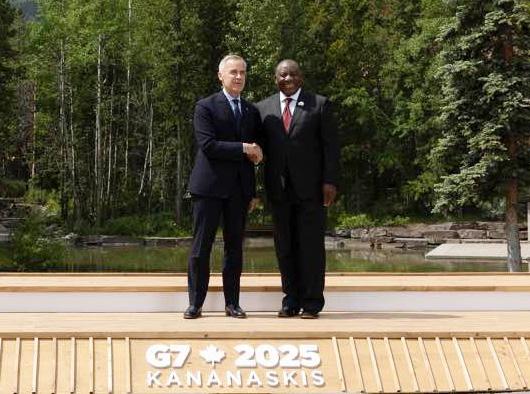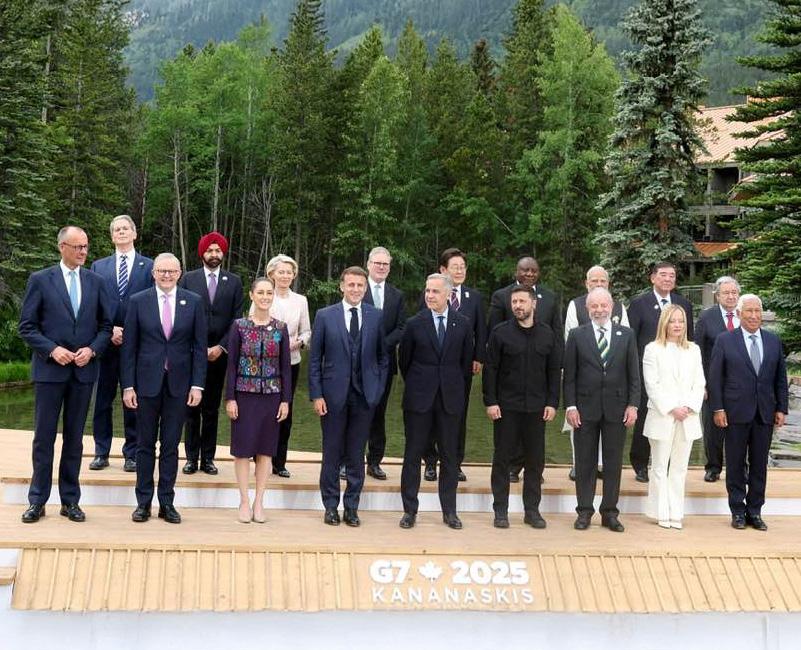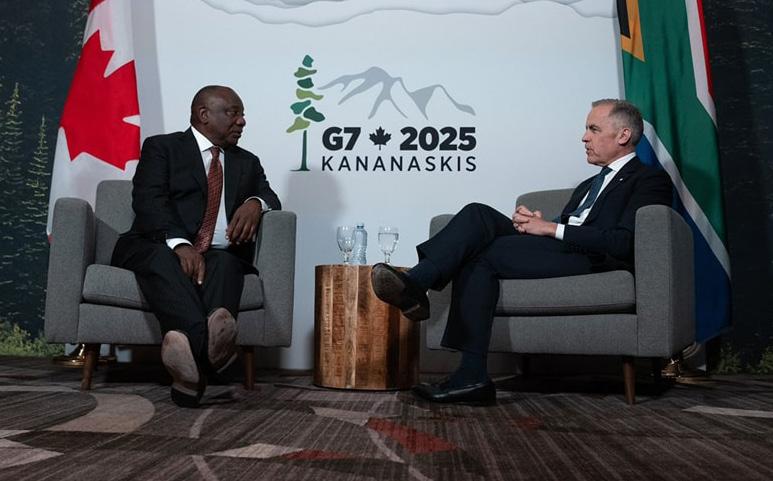
7 minute read
President Cyril Ramaphosa At The G7 Leaders Summit In Canada
Strengthening Bilateral Ties - Putting African Issues Firmly On The Global Agenda
By Shumirai Chimombe
His Excellency President Cyril Ramaphosa was in Canada from 14 to 17 June on a working visit where he participated in the G7 Summit outreach session. The session took place on the margins of the G7 Leaders Summit in Kananaskis, Alberta.
The G7 Summit is an international forum held annually for the leaders of the Group of Seven member states representing the largest advanced economies namely: Canada, France, Germany, Italy, Japan, the United Kingdom and the United States. The European Union also participates in the discussions as a guest. Canada assumed the Presidency of the G7 on 1 January 2025.
Traditionally, the purpose of the outreach sessions at the annual Summit is for the G7 to engage with leaders from the international community. The G7 Summit host invites country leaders and representatives from international organisations to broaden the scope of discussions and build consensus on pressing global issues.
H.E. Ramaphosa was the only African Head of State invited to the Summit as South Africa is the current President of the G20. He took the opportunity to have bilateral meetings with other Heads of State and Government including Canada,
France, Germany and the Republic of Korea which he said had in many ways proven to be most beneficial.
South Africa - Canada & Strengthening Bilateral Relations
Canadian Prime Minister Mark Carney met with H.E. Ramaphosa on Sunday, 15 June ahead of the G7 Leaders Summit. In his warm welcome Prime Minister Carney said that it was a great honour.
“We’ve met a bit in the past and I’ve been a long admirer of your leadership of South Africa and now your leadership of the G20. The world is very much in your hands at a crucial time and if I may say from a Canadian perspective, the strength of the ties between our countries are great, including down to the level of assistance in natural disasters. South Africa has always provided us with support during times of difficulty including with forest fires. We reciprocate and there’s much to be built on together and we look forward to our discussions.”
South Africa and Canada have a Memorandum of Understanding (MoU) signed in 2019, which provides for exchanging wild land fire management resources between the two countries. Since then, South Africa, through the Working on Fire-Kishugu Joint Venture (WOF-Kishugu JV) has deployed six teams of firefighters to Canada to assist in fighting wildfires, including the historic deployment of 860 firefighters and management in 2023, one of the largest deployments of international firefighters to Canada.
In 2024 a team of more than 200 firefighters and management were deployed to Alberta in response to an urgent request from the Canadian Interagency Forest Fire Centre (CIFFC).

H.E. Ramaphosa thanked Prime Minister Carney for the continued wonderful bilateral relations between Canada and South Africa. “We’ve had a long relationship and we’re very proud of the way that we deal with each other. We support your buyers, you support us with investments and you’ve supported our Just Energy Transition. So our relations are strong.”
After the bilateral meeting, the Prime Minister of Canada’s official website reported that the discussion centred around the strong and growing partnership between Canada and South Africa, with increased cooperation in wildfire management, technology, and trade and investment. The leaders discussed advancing shared priorities under their G7 and G20 presidencies, such as energy security, critical minerals, artificial intelligence, and climate resilience, including wildfires.
The Outreach Session - Focusing on Energy Security
This year’s G7 Outreach Session had a special focus on energy security. According to the South African Presidency the session had aimed to explore leadership and collaboration in driving a comprehensive approach to energy security with a focus on technology and innovation; diversification and strengthening critical mineral supply chains; and infrastructure and investment. The theme therefore resonated with South Africa’s national interests and priorities for its G20 Presidency.
Her Excellency the Right Honourable Mary Simon, Governor General of Canada hosted a dinner to welcome the leaders participating in the G7 Summit outreach session. In her address she said that there is great power in working and learning together, with mutual respect. “We can use this time together to strengthen the future of our energy security…. We need to be listening to each other. Being curious about different points of view. It’s a good place to start. That is the value in diplomacy. We accept that we don’t have to agree. And then we carry on with the conversation. By getting to know our neighbours, we gain a greater understanding of their ideas. Of their struggles.”
She also emphasised the value of engaging young people as leaders of the future. She said that working together is also the only way to transfer hope to young people. “The power of your conversations here will bring new paths to peace. New paths to energy security. New prosperity to our citizens. We are just one part of a much bigger picture. An interconnected system of air, water, land, and wildlife. Each part of that system of nature is necessary, and each relies on the others. And so it is with us.”
Speaking to the media in Kananaskis after the event, President Ramaphosa said that the visit to Canada to attend the G7 Summit had been most meaningful especially since South Africa is the President of the G20. He welcomed a strengthening of ties with Canada calling their Africa strategy comprehensive with the potential for cooperation in areas where there was alignment with the African agenda.
“We’ve had the opportunity to interact with a number of Heads of State and Government of various countries. And the issues that we put on the table were the issue of climate change and how important it should be treated by the global community with regard to our Just Energy Transition, and also what we intend to achieve out of the G20 with regard to climate change financing.”
He highlighted that the effects of climate change needed to be dealt with, particularly the floods that affected the country which resulted in people dying and the destruction of infrastructure. He pointed out how the Kwazulu-Natal and the Eastern Cape provinces have suffered over just the past few years from repeated incidents of destruction from floods, and also droughts in parts of the Western Cape.
President Ramaphosa also added that the issue of critical minerals had been discussed, and the importance of how they should be treated particularly since they play such an important role in energy security.
“And that the extraction of minerals from African countries and our, own country particularly, should be more than being only extractive, but also to have value add where beneficiation becomes the order of the day; and where they who want to invest in our minerals should know upfront that we are not only looking forward to them extracting minerals but also to value chain additions or advancements in the form of beneficiation, so that in the end we live up to what we’ve been saying. That we want to sell value-added products to the rest of the world.”

Source: The Presidency | Department of Forestry, Fisheries and the Environment | Prime Minister of Canada website | The Governor General of Canada website

